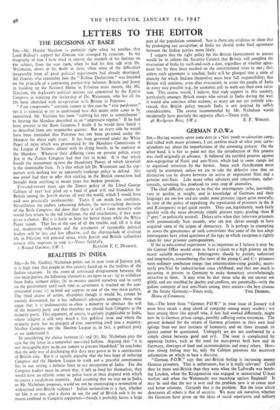REALITIES IN INDIA
SIR,—As Mr. Godfrey Nicholson points out in your issue of January 3rd, it is high time that people in this country faced up to the realities of the Indian situation. In the event of continued disagreement between the two main parties, the following alternatives are open to us : (a) to withdraw from India without delay; (b) to resume control ourselves and to carry on the government until such time as agreement is reached on the con- stitutional issue; (c) to lend our support to one of the two main parties. The third course .of action, disastrous though it would be, cannot be entirely discounted, for it has influential advocates amongst those who argue that it is undemocratic to allow a minority to obstruct the will of the majority party and that therefore we should back Congress as the majority party. This argument, of course, is entirely inapplicable to India, where religion is still very much a live political issue and where the minority party has no prospect of ever converting itself into a majority. Neither Congress nor the Moslem League is, in fact, a political party as we understand it.
In considering the choice between (a) and (b), Mr. Nicholson puts the case for the latter in a somewhat one-sided fashion. Arguing that " it is our inescapable duty to do our utmost to prevent bloodshed," he concludes that the only way of discharging this duty may prove to be a continuance of British rule. But it is equally arguable that the best hope of inducing Congress and the Moslem League to work out, a peaceful compromise lies in our setting a definite limit to our occupation of India. For the Congress leaders must be aware that, if left to fend for themselves, they would have no reliable army or police force at their disposal with which to coerce a recalcitrant minority. And assuming that we stay on in India, as Mr. Nicholson proposes, would we not be encouraging a resumption of widespread anti-British violence? Indian nationalism is a fact, whether we like it or not, and a desire to see the end of British rule is by no means confined to Congress supporters—though it probably leaves a large part of the population unmoved. Nor is there any evidence to show that by prolonging our occupation of India we should make final agreement between the Indian parties more likely.
I suggest that the right policy for the British Government to pursue would be to inform the Security Council that Britain will complete the evacuation of India by such-and-such a date, regardless of whether agree- ment has by then been reached on the constitutional issue or not ; that, unless such agreement is reached, India will be plunged into a state of anarchy for which Indians themselves must bear full responsibility; that Britain will continue, even after evacuation, to assist the people of India in every way possible (e.g., by economic aid) to work out their own salva- tion. This course would, I believe, find wide support in this country, particularly amongst British troops who served in India during the war; it would also convince other nations, as many are not yet entirely con- vinced, that British policy towards India is not inspired by selfish considerations. The course recommended by Mr. Nicholson would incidentally have precisely the opposite effect.—Yours truly,


































 Previous page
Previous page